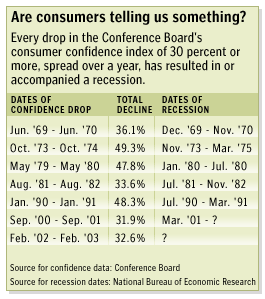NEW YORK (CNN/Money) -
U.S. consumers are sunk in a crisis of confidence, one of the worst in the past 35 years, and every other funk this bad during that time has resulted in a recession. Economists think this time will be different, but there's plenty of reason for concern.
The University of Michigan's consumer sentiment index for February was revised slightly upward on Friday, according to a Reuters report, adding to a day of generally benign economic data that showed Chicago manufacturing activity still growing and a stronger economy at the end of 2002 than first estimated.
That was the good news. The bad news was that the Michigan index was still at its lowest point since October 1993, and it echoed a report by the Conference Board earlier in the week that its measure of consumer confidence had also fallen to the lowest level since the fall of 1993.

In fact, the Conference Board index has fallen 32.6 percent since February of 2002, a bigger drop than the 31.9 percent decline from September 2000 to September 2001.
What's more, every year-long drop of 30 percent or more in the Conference Board index since 1968 has been either immediately followed by or coincided with a recession. Is the economy headed for another recession?
"The answer is: we might be," said Conference Board economist Ken Goldstein. "On the other hand, we've never had a circumstance quite like this one -- so how much is past prologue?"
The circumstances in which the U.S. consumer finds himself or herself in late February 2003 include:
- After a recession in 2001, when businesses cut nearly 1.8 million jobs, the labor market has yet to find its legs, with unemployment hovering between 5.7 percent and 6 percent for more than a year;
- Stock prices have fallen for three straight years;
- Terror attacks, terror alerts and a war on terror have dominated the news in the past year, only taking a break early last year to make way for a rash of corporate accounting scandals;
- The United States seems almost certain to enter a war in Iraq, the human and economic costs of which are still unknown; and
- Prices for oil, gasoline and natural gas are skyrocketing.
In fact, if you want another scary historical comparison, check out the price of oil. Since 1973, whenever oil prices have jumped by more than 50 percent on a year-over-year basis, a recession has followed. As of Friday morning, crude oil prices had spiked more than 72 percent from a year ago.
Higher energy prices cut into consumers' discretionary spending and raise the cost of doing business, squeezing already narrow corporate profit margins.
After a long slump in spending in the wake of the popping of the late-1990s investment bubble, businesses are slowly starting to invest again, but they're mainly restocking inventories and replacing worn equipment. Hiring is non-existent, with the number of weekly claims for unemployment insurance still high and measures of hiring intentions falling.
| Related stories
|

|
|
|
|
Even measures showing steady improvement in manufacturing activity -- including the Institute for Supply Management's national index and regional indexes from the Philadelphia Federal Reserve, the New York Fed and Chicago purchasing managers -- consistently reflect little or no hiring in a sector that's been shedding jobs for years.
Most economists think business spending and hiring will gather steam as soon as the situation in Iraq is resolved, but some think the damage done by crippled confidence and higher oil prices early this year will take some time to sort out.
U.S. gross domestic product (GDP) grew at an annual rate of 1.4 percent in the fourth quarter of 2002 -- a rate less than half of its recent historical trend -- and seems unlikely to do much better in the first or second quarters. Without stronger growth, it seems unlikely that much hiring will follow.
"We are talking about an economy averaging about 30 miles per hour in a 60-mph speed zone," said Lehman Brothers economist Joe Abate. "That keeps pressure on the unemployment rate, forcing it to continue to rise. By summer, we could have 6.4 percent unemployment."
Consumer spending has in part been supported by super-low interest rates that have led to strong demand for housing, raising home values, improving consumer wealth and letting people refinance their mortgages at lower rates.
But the housing market can't drag the world's biggest economy along behind it forever. And if rising unemployment leads to a further deterioration of consumer confidence, a vicious cycle could develop.
"There can be a circular effect -- if consumers lose confidence and businesses are nervous that the consumer will stop spending, and they downgrade production expectations or lay people off or stop hiring people because they don't think they'll get revenue, that makes consumers more nervous," said Brown Brothers Harriman economist Lara Rhame.
Still, Rhame attributed only a 20 percent chance to the possibility of another recession, and most economists share her optimism.
The economy can survive the drop in confidence and the oil spike, they say, as long as it's short-lived. What's more, the economy has just exited a down cycle, with businesses lean and mean and perhaps ready to spend a ton when the economy shows signs of life.
And if history has taught anything, it's that drops in consumer confidence don't always translate into drops in spending. In fact, the last time consumer spending actually declined was in the fourth quarter of 1991.
"We've been seeing double-digit declines in confidence for more than a year, yet people don't mind buying a new car or a truck or trading up for a new house or taking out a second mortgage -- you would think these people have guns to their heads," said Natexis Bleichroeder economist James Padinha. "We feel so lousy, but it sure doesn't seem like we're behaving that way."

|

